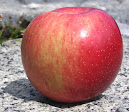From time to time I am flattered by questions from readers who assume I know more than I do, especially about growing apples. (My expertise lies in the eating part of the process.)
 |
Thanks to some other readers, who do know a thing or two, I am pleased to pass on the following sources for scionwood, also know as budwood, for older varieties.
Apple varieties do not run true from fruit to seed to tree, so they are propagated by grafting scionwood onto rootstock. Each graft is in effect the same tree, daughter of one singular seed.
These trees do not live forever, and if no one grows them an apple variety cannot be bred again.
Tower Hill sells budwood from its heirloom orchard, including many varieties that are scarce on the ground today. Fedco, a coop in Maine, offers more than 100 varieties, including many antiques and heirlooms. Both charge $3 per stick.
Also, save March 27 on your calendar. It's the date this year [2011] of the annual Seed Swap & Scion Exchange sponsored by the Maine Organic Gardeners and Farmers Association.
If you are wondering what to do with your scionwood, Kevin Hauser over at Apples and Oranges has prepared this video (among others) showing you how to graft. Better order some rootstock while you are at it.
Kevin makes grafting look easy (and fun), but if you are skittish Fedco will sell you whole trees. Other nurseries such as Trees of Antiquity sell trees too.
Growing these old apples, or any apples for that matter, is a glad thing. I cheer for apple farmers great and small.
To them I say: Once you have planted and grown and pruned these trees and tended and harvested their fruits, should you need any help in the eating department, I stand ready to do my part.
Thanks to Karelj for putting his lovely photo of living grafted budwood in the public domain.

Adam,
ReplyDeleteMy daughter and I have a strange request. We were visiting an older couple, well into their eighties, last night. The husband was talking about "Ripston Pippin" and "Sheep-nose" apples. Both varieties grew successfully, at his family home in Toronto when he was a child. He has such found memories of these apples. Do you know how we could purchase one or two of these varieties and have them lovingly shipped to central and snowy Ontario, Canada?
Thanks, Adam. Enjoying your blog- very creative.
Kathie and Brigid Hogan
Parry Sound, Ontario, Canada
cumminsnursery.com
Deleteithaca, ny
DeleteKathe, "Ripson" Pippin is almost certainly Ribston Pippin; both it and the Sheepnose apple (aka Black Gilliflower) are reviewed on this blog.
ReplyDeleteFedco (link above) lists Ribston trees but as out of stock. You could inquire, however. Trees of Antiquity has both varieties (Sheepnose as Black Gilliflower).
There is not a lot of demand for these older varieties, hence not a lot of supply, especially as trees. Budwood is easier to find. If the above links do not work out, perhaps you could arrange for a local nursery to graft the budwood for you.
Best of luck to you in this project!
Adam, we were searching for four APPLES. Not the trees. (that's why I said it was a strange request). I just wanted to bring to life one of my older friend's fondest memories- the taste of a Ripston Pippin apple.
ReplyDeleteIf you think of any way that this might happen, I would appreciate it.
Thanks,
Kathie
hogans@vianet.on.ca
Ah, excuse me, Kathie--"varieties" is ambiguous, especially in this context. I don't have a good answer to your question, as these apples are hard enough for me to come by even though they do grow around here.
ReplyDeleteOf course, if you are to have any luck at all, it can only be in season. It's not out of the question that someone in Ontario grows these varieties, but all the heirloom orchards I know of that might have these are in New England. I'm thinking of Shelburne Farm in Stow, Mass., Gould Hill in Hopkinton, N.H., and perhaps Poverty Lane Orchard in Lebanon, NH.
I describe the first two of these on this blog.
I do not know that any of these will ship, but Poverty Lane is in the heirloom business and might ship or be able to advise you further. Good luck!